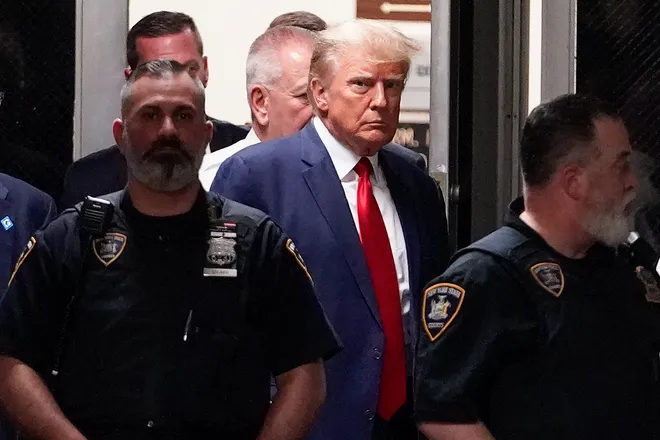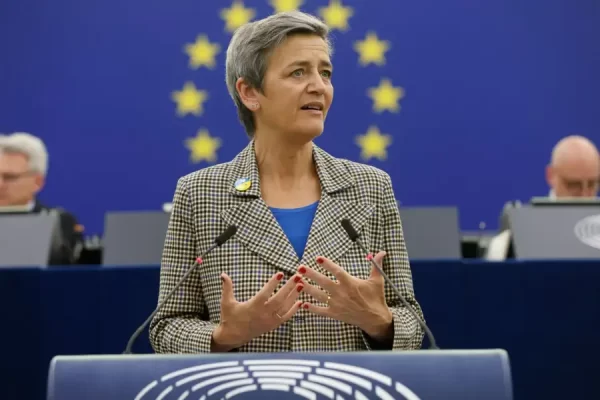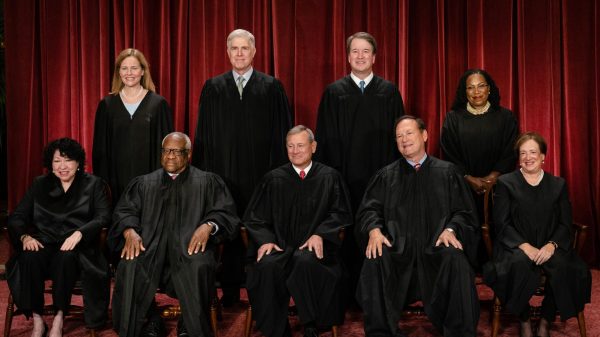Donald Trump arrested on 34 felony charges
For the first time ever, a former U.S. president is facing criminal charges.
Following Donald Trump’s official indictment by a New York Grand Jury on March 30, the former president turned himself into the New York Police Department (NYPD) on April 4. He pleaded not guilty to 34 felony counts of falsifying business records inside of the Manhattan Criminal Court.
The charges broken down
When Trump was first running for president, his personal lawyer, Michael Cohen, paid $130,000 to a woman named Stephanie Gregory Clifford on Oct. 27, 2016.

Clifford, known publicly as Stormy Daniels, claims Cohen negotiated a deal with her to stay silent about past relations with Trump. Shortly after, Cohen wire transferred her the money, allegedly on Trump’s behalf.
Besides reimbursing Cohen, the 34 charges are for the 34 supposed instances of related criminal activity.
This particular payment took place a mere six days before the 2016 election on Nov. 3, which prosecutors argued was intended to prevent the allegations from losing Trump the election.
It would have been an “October surprise”, a term experts use to describe last-minute public controversies that impact elections the month before they happen.
This would be legal if it were a regular payment between individuals. However, the transactions were filed as legal expenses for the Trump Organization, while prosecutors claim they were actually from Trump’s personal finance account to reimburse Cohen.
Section 175.05 of the New York penal code classifies this as falsifying business records in the second degree, a misdemeanor. However, the case’s prosecutors, led by Manhattan District Attorney Alvin Bragg, argue Trump committed the crime as part of a greater criminal conspiracy to interfere in the 2016 presidential election.
If true, this instead falls under Section 175.10, which classifies the crime as falsifying business records in the first degree. This is considered a class E felony in New York, and if found guilty, Trump could serve up to four years in state prison.
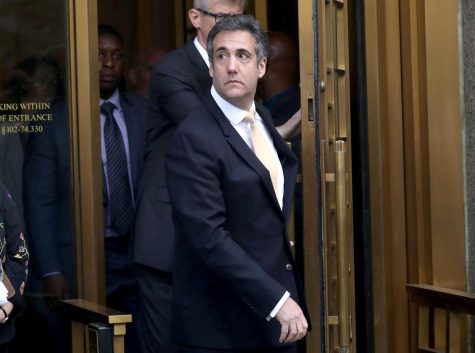
Cohen pled guilty to eight criminal charges, including the payment to Daniels, on Aug. 31, 2018, and was sentenced to three years in prison. He was released on November 22, 2021. Trump was not expected to accept a similar plea deal.
Trump and his defense team are instead pleading not guilty. Outside of the courthouse, Trump’s attorneys claimed the court documents were “insufficient in information”, and did not have factual evidence to support the charges. They added Trump is “frustrated, upset and believes that there is a great injustice happening in this courtroom today.”
Trump and his allies have called the case politically motivated.
Supporters of this theory cite the fact that criminal investigations of Trump are happening across the country.
They include this case, an alleged attempt to interfere in the 2020 election in a call between Trump and the Georgia Secretary of State, and inquiries into the extent of Trump’s involvement in the Jan. 6 insurrection, an event where a group of radical Trump supporters broke into the Capitol building while the 2020 election results were being certified.
While other politicians get off scot-free, they argue opponents of the former president are adopting a “spaghetti on the wall approach,” seeing what faulty case sticks.
How the arrest happened
Trump revealed that he anticipated his arrest on his personal social media platform Truth Social on March 18, 2023.
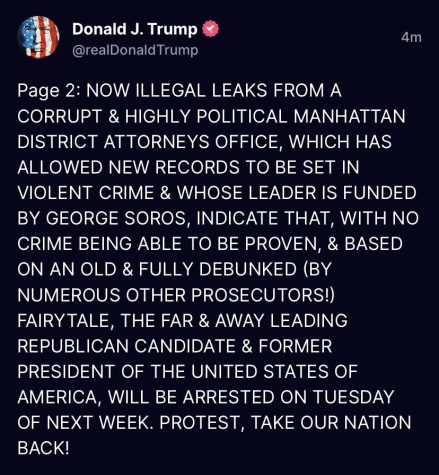
“WITH NO CRIME ABLE TO BE PROVEN & ON AN OLD AND FULLY DEBUNKED FAIRY TALE… [I] WILL BE ARRESTED ON TUESDAY.” said Trump, “PROTEST, TAKE OUR NATION BACK!”
The call to protest raised concern in the NYPD that the arrest would cause protests similar to the Jan. 6 insurrection. In response, they surrounded the Manhattan courthouse with steel barricades and increased security personnel around the courthouses and Trump Tower including several hundred officers and 35,000 on standby.
On Thursday, Trump was officially indicted by the grand jury. If Trump did not voluntarily turn himself in, they would have had to detain him by force.
Trump currently owns and lives at the Mar-a-Lago resort in Palm Beach, Florida, meaning the NYPD would have had difficulty arresting him without the assistance of Floridian authorities. The night of the indictment, Florida Gov. Ron DeSantis said their government would “not assist” in a Trump “extradition.”
Later that day, Trump’s campaign for the 2024 presidential election revealed he would willfully turn himself into the NYPD on April 4 instead.
He flew from Florida to New York City, where he stayed overnight at the Trump Hotel.
The next day, Secret Service agents covertly escorted Trump in a motorcade to the Manhattan courthouse, where he was filmed and photographed as he entered the building to surrender.
Although minimal information was publicly available about the events that took place inside the courtroom, the 34 counts contributing to his indictment were unsealed.
Trump, accompanied by Secret Service agents and his attorneys, exited the courtroom later in the afternoon amidst a crowd of reporters. He did not take questions.
Protests erupted along the streets of Manhattan, and though crowds became unruly, widespread violence was averted.
Shortly after, Trump left to return to Mar-a-Lago, and his campaign announced he would deliver an address after arriving.
Trump speaks out
In his first public speech since the case unraveled, Trump issued a list of grievances, clashed with his opponents in the ongoing case, and reinforced the messages of his 2024 presidential campaign.
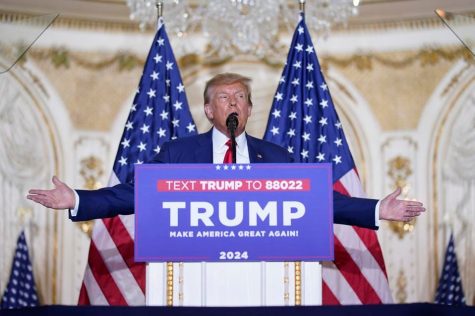
In regards to the “hush money” case, he reprimanded District Attorney Bragg, making misleading claims that he is “doing Joe Biden’s dirty work, ignoring the murders and burglaries and assaults he should be focused on”.
This was among numerous attacks on those involved in his prosecution; he posits many of them act as puppets serving the interests of “corrupt Democrats”. In particular, imposing “political persecution” on him.
All of this came as a part of his overall rhetoric, which revolved around criticism of Democrats and the Biden administration. He blamed the 2021 Taliban takeover of Afghanistan, the war in Ukraine, and the inflation crisis on Biden.
His campaign strategy centers around claims of him being treated unfairly by the political establishment in various controversies, including his “perfect call[s]” with Ukrainian President Volodymyr Zelenskyy, the subject of his first impeachment, and the Georgia Secretary of State, the subject of a current criminal investigation. He also deemed his impeachment over the Jan. 6 insurrection a “witch hunt”.
He continued to make debunked accusations that the 2020 election was rigged against him, claiming there are “government videos” of “hundreds of thousands of ballots being dumped”.
This case is the latest in a series of incidents that are perceived as unjust persecution against him and the liberties of his base. His message implies that a vote for Trump is a contribution to the battle against corruption in politics, a strategy he is once again employing in the 2024 election.
Impacts on the 2024 Election
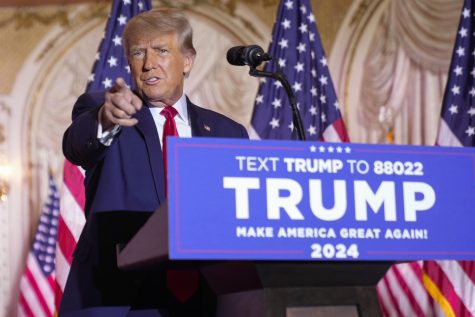
This early on, the case’s impacts on the 2024 election remain unclear. In spite of this, statistical evidence and expert analysis suggest what its effects may be.
Technically speaking, individuals charged with crimes or imprisoned can still run for the presidency. Article II, Section V of the United States Constitution outlines the sole requirements for a presidential candidate. They must only be a “natural born Citizen… thirty-five Years [of age]… and] a Resident within the United States for [14 years]”.
This precedent was exemplified when socialist politician Eugene Debs ran for President in 1920 while he was imprisoned. It is further evidenced by Joe Exotic of “Tiger King” fame, who announced he is also running for president despite being a convicted felon.
However, in his current state of affairs as just a criminal defendant, which is not expected to change until at least late 2024, Trump’s ability to win the Republican (GOP) nomination for President is uncertain.
Following the GOP’s performance in the 2022 midterm elections falling short of expectations, he announced his campaign for president, which received less support from other party members than initially anticipated.
Nikki Haley, former ambassador to the United Nations under the Trump administration and previous South Carolina governor, announced her candidacy on Feb. 14, the first of what is expected to be many.
Of all the potential opponents to Trump in a GOP nomination race, DeSantis is the most popular.
Polling data from December 2022, shortly after the Midterms, reveals conservative voters preferred DeSantis over Trump 52 percent to 38 percent. However, the results have swung drastically since the controversy unfolded, and they appear to be in Trump’s favor.
When given a list of potential GOP nominees, 54 percent of recent poll respondents chose Trump as their top choice. DeSantis was his closest competition but only came in at 24 points. Trailing behind were former Vice President Mike Pence at 6 percent, while former Wyoming Rep. Liz Cheney and Haley came in at 3 percent.
His strategy appears to have worked marvelously, and he is more likely to attain the nomination now than ever before. It is unlikely a single alternative candidate will be able to usurp him, with votes likely becoming divided among various options.
If the arrest truly was politically motivated, and prosecutors are unable to secure a conviction, it would mean it severely backfired and ended up energizing supporters to oppose an unjust system.
How leaders are reacting
The majority of GOP leaders have shared the base’s outrage.

Texas Sen. Ted Cruz called the case a “catastrophic escalation in the weaponization of the justice system” while Colorado Rep. Lauren Boebert claims it is “another political witch hunt targeting the people’s President”
GOP Speaker of the House Rep. Kevin Macarthy claimed “Bragg’s weaponization of the federal justice process will be held accountable by Congress”, threatening interference from the federal government.
Contrastingly, some GOP leaders have instead opted to stay silent, such as Senate Minority Leader Mitch McConnell, who was previously one of Trump’s strongest allies.
Utah GOP Sen. Mitt Romney, the GOP nominee for President in 2012, remains one of Trump’s most vocal critics within the party. He also neglected to comment on the case.
On the opposing side of the aisle, Democratic leaders have proclaimed this case is simply the justice system doing its job.
White House Press Secretary Karine Jean-Pierre weighed in on behalf of the Biden administration.
“It’s an ongoing case, we’re not going to comment on the case itself,” said Pierre. “The president’s going to focus on the American people like he does every day. This is not something that is a focus for him.”
What Americans think
Additional polling data states 53 percent of Americans believe Trump intentionally committed a crime, while 11 percent believe it was unintentional, for a total of 64 percent believing he was in the wrong. Only 20 percent believe Trump is fully innocent, with 16 percent being unsure.
However, the specific reactions are partisan in nature. 87 percent of Democrats believe he committed a crime, as do 57 percent of independents.
On the other hand, only 45 percent of Republicans believe the former president did nothing wrong. The rest of the respondents are split between believing he knowingly committed a crime, accidentally committing a crime, and being unsure.
Though Trump may fare well in the race for the GOP nomination, the broader consensus of Americans is less favorable to him.
50 percent of respondents believed the charges were justified, while 50 percent also think the case is politically motivated as well.
A further 48 percent thought Trump should suspend his campaign for president, a notable increase from before, especially among independents, 54 percent of whom believe the charges to be serious.
Experts report that if Trump is indicted for more damaging investigations, regarding alleged attempts to overturn the 2020 election results, the reactions will be even less favorable to him.
Many anticipated the arrest to be more of a spectacle than the peaceful submission to authorities provided.
In the days prior to the indictment, images created by artificial intelligence spread on the internet. The viral pictures depicted Trump escaping from police officers or being forcefully detained by law enforcement.
His attorneys and supporters still argue for his innocence, with Trump’s attorney Joe Tacopina saying the arrest “shows that the rule of law died in this country.”
How the trial will unfold
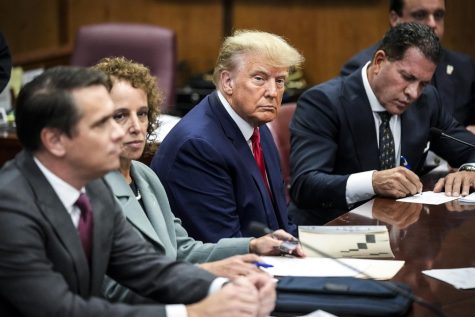
Trump’s case is expected to go to trial. It remains to be seen how the case will play out, but the information presently available has prompted speculation.
“If I had to pick whose side to be on, and I had to win to save my life, I would probably choose to be on the prosecution’s side,” said Matthew Galluzzo, a former New York attorney. “The jury pool in Manhattan is so incredibly against Donald Trump.”
Though there remains a possibility for him to be found not guilty in a trial, there is another way he can come out on top.
“If he can push things back until after the election then he can effectively win the trial that way,” said Galluzo.
If Trump were to be convicted after being elected president, there is no judicial precedent for what should be done, but the Supreme Court with a 6-3 conservative majority would likely permit it.
However, this scenario is unlikely.
“[If there was] a real risk of both a conviction and… jail time rather than a fine, that would be clear before the election occurs,” said Aziz Huq, professor of law at the University of Chicago.
The final outcome of this case, and the other investigations into Trump’s alleged criminal activity, remains to be soon, but all involved fully intend to proceed.
“[You] don’t get a ‘get out of jail free’ card just because you become President,” said Huq. “Everyone has the right to prove their innocence until proven guilty, and that includes Mr. Trump.”

